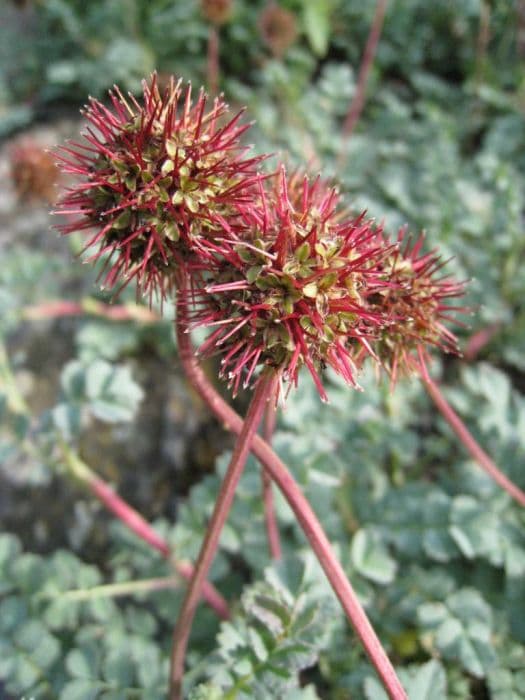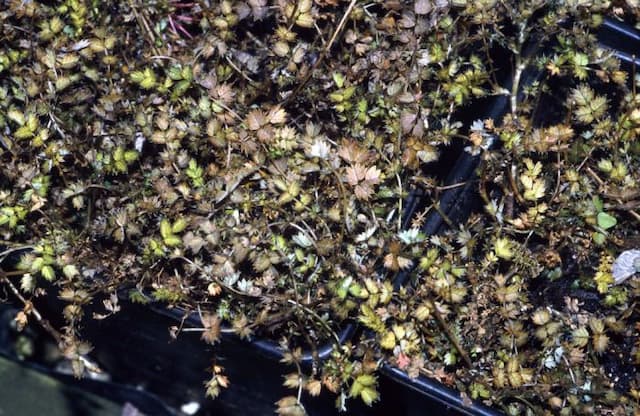Marjorie Fair Rose Rosa Marjorie Fair = 'Harhero' (Poly/s)
![rose [Marjorie Fair]](/_next/image?url=https%3A%2F%2Fplants-admin.emdemapps.com%2Fimages%2Fplants%2F%2Fimages%2F604b587c679a8.png&w=3840&q=75)
ABOUT
Rosa Marjorie Fair, commonly known as a type of rose, features a stunning display of semi-double flowers that blossom in a rich, coral-pink hue. The petals are delicately arrayed in a way that creates a soft, rounded appearance, with a slightly cupped shape that beckons viewers to take a closer glance. Each flower is comprised of numerous overlapping petals, which, as they unfurl, reveal a subtle, lighter reverse, adding depth and contrast to the bloom. The foliage of Rosa Marjorie Fair is equally as impressive, boasting glossy, dark green leaves that provide a striking backdrop for the vibrantly colored flowers. These leaves have a leathery texture and are shaped with a classic elongated form, tapering to a point. The stark contrast between the deep greenery and the coral pink blossoms makes the plant a visually arresting specimen in any garden. Moreover, the overall arrangement of the flowers and foliage produces a lush, full look that is characteristic of this type of rose. Throughout its blooming season, the plant becomes a prolific producer of blooms, which often appear in clusters, creating a bouquet-like effect that is highly sought after by gardeners and rose enthusiasts. Rosa Marjorie Fair is not only appreciated for its aesthetic qualities but also for its resilience and hardiness, making it a favorable choice for various garden settings. The plant’s flowers emit a mild fragrance that is pleasantly perceptible, completing the multi-sensory experience it offers. In essence, this rose variety encapsulates the traditional elegance of roses while presenting it with a fresh, inviting color palette.
About this plant
 Names
NamesFamily
Rosaceae
Synonyms
Marjorie Fair Rose
Common names
Rosa 'Harhero' (Poly/s).
 Toxicity
ToxicityTo humans
The Rosa 'Harhero', commonly known as a variety of rose, is not known to be toxic to humans. Roses do not typically contain compounds that are poisonous to people, and they are generally considered safe to touch and handle. However, roses have thorns that can cause physical injury if not handled with care. Ingesting large quantities of rose petals, leaves, or thorns could potentially lead to gastrointestinal discomfort due to the physical irritation they may cause, but this is not due to toxicity.
To pets
Similar to their effects on humans, roses, including the Rosa 'Harhero', are not known to be toxic to pets. Pets that chew on rose plants may experience mild gastrointestinal upset due to the physical irritation from the fibrous plant material or thorns, but this is not a result of poisonous substances in the plant. It is always recommended to monitor your pet around plants, as individual animals may have different sensitivities or allergic reactions.
 Characteristics
CharacteristicsLife cycle
Perennials
Foliage type
Deciduous
Color of leaves
Green
Flower color
Pink
Height
2 feet (60 cm)
Spread
2 feet (60 cm)
Plant type
Shrub
Hardiness zones
6
Native area
Cultivar
Benefits
 General Benefits
General Benefits- Ornamental Value: Rosa Marjorie Fair is known for its attractive salmon-pink flowers, which add aesthetic appeal to gardens and landscapes.
- Fragrance: The plant is appreciated for its pleasant scent, which can enhance the sensory experience of a garden.
- Pollinator Attraction: The flowers can attract bees and other pollinators, supporting local ecosystems and promoting biodiversity.
- Long Blooming Period: Rosa Marjorie Fair typically has a prolonged blooming season, offering a long-lasting display of flowers.
- Hardiness: This plant is known for its resilience and can thrive in a variety of climates, making it a robust choice for many gardeners.
- Low Maintenance: As a polyantha rose, it often requires less upkeep compared to other rose varieties, which is ideal for gardeners seeking low-maintenance plants.
- Versatility: The plant can be used in various garden settings, such as borders, flower beds, and as ground cover, offering flexibility in garden design.
- Propagation: It can be easily propagated through cuttings, allowing gardeners to expand their rose collection without additional cost.
 Medical Properties
Medical PropertiesThis plant is not used for medical purposes.
 Air-purifying Qualities
Air-purifying QualitiesThis plant is not specifically known for air purifying qualities.
 Other Uses
Other Uses- Pressed Flower Art: The petals of Rosa Marjorie Fair can be pressed and used in art projects to create beautiful designs and patterns on paper or fabric.
- Natural Fabric Dyes: The pigments from the petals can be used to dye fabrics and yarns a soft pink or rose hue.
- Rose Water: Distilling the petals can produce rose water which is used in culinary recipes to impart a delicate floral flavor to pastries and sweets.
- Eco-Friendly Confetti: Dried petals of Rosa Marjorie Fair can be used as biodegradable confetti for weddings or celebrations.
- Floral Baths: Petals can be added to bathwater for a luxurious, relaxing, and fragrant bathing experience.
- Candle Making: These roses can be incorporated into homemade candles for their scent and a touch of elegance within the wax.
- Homemade Potpourri: Dried Rosa Marjorie Fair petals can be mixed with other dried flowers and spices to create natural potpourri.
- Rose Petal Jam: The flowers can be used to make a sweet and aromatic jam that's a delicacy in some parts of the world.
- Floral Ice Cubes: Freezing petals into ice cubes adds an elegant touch to cocktails and other beverages.
- Garden Compost: Fallen leaves and petals from Rosa Marjorie Fair can be added to compost bins to enrich the soil with organic matter.
Interesting Facts
 Feng Shui
Feng ShuiThe Rose is often used in Feng Shui to attract love, create a calming atmosphere, and bring positive energy. Place pink roses in the southwest area of your home or garden to enhance romance and love relationships, or in the living room to create a sense of peace and harmony.
 Zodiac Sign Compitability
Zodiac Sign CompitabilityThe Rose is not used in astrology practice.
 Plant Symbolism
Plant Symbolism- Love: As a type of rose, the Rosa 'Marjorie Fair' represents love and romance, carrying the universal symbolism of roses being associated with deep affection and passion.
- Beauty: Roses have long been admired for their beauty; the 'Marjorie Fair' with its attractive flowers symbolizes physical beauty and grace.
- Balance: The harmonious growth and form of this rose may represent balance in one's life, reflecting equilibrium and steadiness.
- Femininity: Roses are often connected with femininity due to their delicate petals and soft appearance, suggesting the gentle qualities traditionally associated with women.
- Mystery: The depth of color and layers of petals in roses can symbolize mystery, indicating there is more beneath the surface waiting to be discovered.
- Devotion: Given as a gift, roses denote a deep sense of commitment and devotion, conveying loyalty to a loved one or a cause.
- Honor: In some contexts, roses can represent honor and reverence, possibly commemorating a person's achievements or serving as a symbol of respect.
- Timelessness: Roses have been cherished throughout history; the 'Marjorie Fair' evokes the timeless nature of beauty and the enduring quality of love.
 Water
WaterThe Marjorie Fair Rose requires consistent moisture to remain healthy, but it's important to avoid overwatering to prevent root rot. During active growing seasons in spring and summer, water the plant once a week with approximately 1 to 1.5 gallons of water, ensuring that the soil is moist but not waterlogged. In hotter, drier periods, you may need to water twice a week, while in cooler or rainy weather, reduce watering to once every two weeks. Always check the top inch of soil for dryness before watering. During the dormant winter period, water sparingly, just enough to keep the soil from drying out completely.
 Light
LightThe Marjorie Fair Rose thrives best in full sunlight where it can receive at least six hours of direct sunlight per day. An ideal spot would be an east or west-facing garden that benefits from the morning and afternoon sun. Adequate light is crucial for optimal bloom production and overall plant vigor.
 Temperature
TemperatureThe Marjorie Fair Rose prefers a temperate climate with temperatures ranging between 65–75°F for ideal growth. It can tolerate minimum temperatures down to about 20°F and maximum temperatures up to approximately 90°F, though extreme temperatures for prolonged periods can be harmful to the plant. Avoid placing the rose in areas where it can be exposed to harsh winds or late frosts in the spring.
 Pruning
PruningPruning the Marjorie Fair Rose is essential for encouraging a healthy, open structure and abundant blooms. Prune in early spring, removing dead or diseased wood and thinning crowded areas, cutting back to a strong outer-facing bud. Additionally, deadheading spent flowers throughout the blooming season can encourage further blooms. Severe pruning should be avoided; instead, focus on light to moderate pruning to maintain shape and health.
 Cleaning
CleaningAs needed
 Soil
SoilThe best soil mix for the common rose 'Marjorie Fair' is one that is rich in organic matter, well-draining, and slightly acidic to neutral in pH, around 6.0 to 7.0. A blend of peat, compost, and perlite or coarse sand would provide the appropriate drainage and nutrient content for optimal growth.
 Repotting
RepottingRoses, including the 'Marjorie Fair' rose, are usually planted in the ground and don't require frequent repotting. However, if grown in containers, they should be repotted every two to three years to replenish the soil and accommodate root growth.
 Humidity & Misting
Humidity & MistingRoses like 'Marjorie Fair' tolerate average outdoor humidity levels well. They don't require exceptionally high humidity, making them suitable for most garden climates without the need for additional humidity control.
 Suitable locations
Suitable locationsIndoor
Grow 'Marjorie Fair' rose indoors with bright light and good air circulation.
Outdoor
Plant 'Marjorie Fair' in sun, enrich soil, water regularly.
Hardiness zone
5-9 USDA
 Life cycle
Life cycleThe life cycle of the 'Harhero', commonly known as Rosa Marjorie Fair, begins with the germination of a seed or the rooting of a cutting, which emerges as a seedling with its first true leaves. As it enters the vegetative stage, the rose plant develops a strong root system and foliage, followed by the formation of long, thorny canes. During the blooming phase, buds develop at the tips of the canes and open into clusters of pink flowers, exhibiting a repeated blooming habit throughout the growing season. After pollination, which can be facilitated by insects or wind, the flowers may produce hips that contain seeds, completing its reproductive cycle. During fall or in response to adverse conditions, the rose plant enters dormancy, reducing its metabolic activities to survive the winter or dry season. With the return of favorable conditions in spring, the rose reawakens to restart the cycle with new growth and a fresh flush of blooms.
 Propogation
PropogationPropogation time
Spring-Early Summer
Rosa Marjorie Fair, commonly known as 'Harhero', is a variety of a Polyantha rose which is commonly propagated through semi-hardwood cuttings. This particular method involves selecting healthy, disease-free stems from the current or previous year's growth. The ideal time for taking cuttings is in late summer to early fall, when the stems are mature but still flexible. Cuttings are typically about 6 inches (15 cm) long and include several leaf nodes. The lower leaves are removed, and the cut end is often treated with a rooting hormone to enhance root development. The cuttings are then planted in a moist, well-draining potting mix and kept in a humid environment until roots have formed and new growth is evident, which usually takes several weeks. This method is favored for its relative ease and good success rate, making it the most popular way to propagate this Polyantha rose.









